| Srl | Item |
| 1 |
ID:
129841
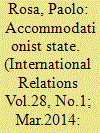

|
|
|
|
|
| Publication |
2014.
|
| Summary/Abstract |
This article aims to highlight the impact of strategic culture on Italian attitude to war and peace. The first section shows how both structural interpretations based on the influence of international variables and domestic models that neglect the cultural dimension offer no adequate explanations of Italy's military behaviour. The second section reviews the literature on strategic culture and its usefulness to explain the Italian case. The third section examines the characteristics of Italy's strategic culture through the period of the Republic, and the fourth examines the influence of ideational factors on its military behaviour abroad. In this section, a series of hypotheses derived from structural and cultural models are tested using data from the Correlates of War dataset. The conclusion provides a summary of the research findings that emerged from the empirical analysis.
|
|
|
|
|
|
|
|
|
|
|
|
|
|
|
|
| 2 |
ID:
155735
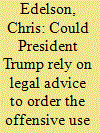

|
|
|
|
|
| Summary/Abstract |
Although the US Constitution permits presidents to order the use of military force without congressional approval only in an emergency context, presidents since Truman—especially after 9/11—have unilaterally ordered the offensive use of military force without congressional approval. Unless Congress asserts its constitutional role, President Donald Trump could continue to draw on this precedent to claim broad discretion to order the use of military force.
|
|
|
|
|
|
|
|
|
|
|
|
|
|
|
|
| 3 |
ID:
109948
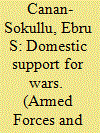

|
|
|
|
|
| Publication |
2012.
|
| Summary/Abstract |
This study examines the differences recorded in transatlantic relations from the viewpoint of mass public opinion in the United States of America, Germany, France, and the United Kingdom concerning military engagements in the post-Cold War era, namely the Kosovo (1999), Afghanistan (2001), and Iraqi (2003) wars. Theoretically, this study builds upon the analysis of the "domestic support for wars" from three mainstream theories of public opinion concerning the use of force; namely, the "principal policy objectives," "ends and means calculus," and the "leadership effect." It also offers a multidimensional approach by introducing a number of variables such as risk, halo effect, multilateral participation, legitimacy, escalation, and self-defence concerning wars. Taking a comprehensive view of the existing polling data on public opinion (1998-2004) an aggregate analytical method is devised and a quantitative analysis of the aggregate polling data is employed to map out correlations between trends in warfare and trends in domestic support for wars.
|
|
|
|
|
|
|
|
|
|
|
|
|
|
|
|
| 4 |
ID:
073980
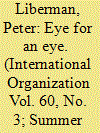

|
|
|
|
|
| Publication |
2006.
|
| Summary/Abstract |
Retributiveness and humanitarianism, predispositions that shape individuals' moral judgment and criminal punishment attitudes, should also influence their positions on war against evil-seeming states. Retributiveness should heighten support for punitive uses of military force, satisfaction from punitive wars, and threats perceived from transgressor states, while humanitarianism should have the opposite effects. Using death penalty support as a proxy measure for these values, public opinion about the 1991 and 2003 Persian Gulf wars provides evidence for a moral-punitiveness effect. Death penalty supporters were significantly more hawkish than death penalty opponents in both cases, controlling for ideology, utilitarian logic, and other potential confounders. These findings explain why foreign villains and good-versus-evil framing heighten public support for war.
|
|
|
|
|
|
|
|
|
|
|
|
|
|
|
|
| 5 |
ID:
017830
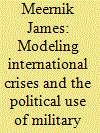

|
|
|
|
|
| Publication |
Sept 2000.
|
| Description |
547-562
|
|
|
|
|
|
|
|
|
|
|
|
|
|
|
|
| 6 |
ID:
072243
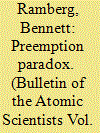

|
|
|
| 7 |
ID:
114218
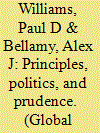

|
|
|